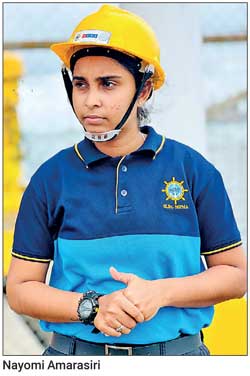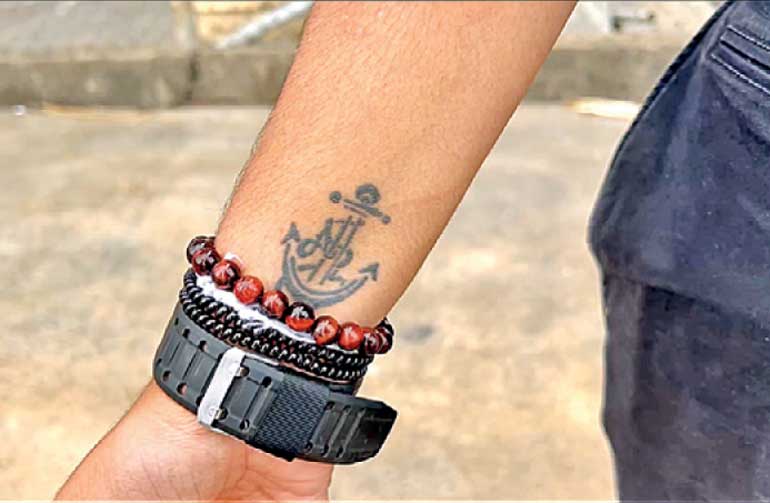Monday Feb 23, 2026
Monday Feb 23, 2026
Thursday, 9 March 2023 00:04 - - {{hitsCtrl.values.hits}}
Nayomi Amarasinghe is the first female seafarer Sri Lanka has ever produced. Last year, an ILO partnership with the Mahapola Port and Maritime Academy helped her to become a seafarer, landing Nayomi a job with the well renowned Carnival Cruise Line giving her a new sense of independence and purpose
 Life is getting harder and harder in Sri Lanka. Sri Lanka’s economy is experiencing unprecedented stagflation, caught in a vice of multiple economic crises impacting businesses, jobs, and income as thousands of workers and their families who struggle to meet ends meet with the economic downturn.
Life is getting harder and harder in Sri Lanka. Sri Lanka’s economy is experiencing unprecedented stagflation, caught in a vice of multiple economic crises impacting businesses, jobs, and income as thousands of workers and their families who struggle to meet ends meet with the economic downturn.
In the midst of the crisis, Nayomi Amarasiri, a 21 year-old first Sri Lankan female seafarer, landed a good job with the world famous Carnival Cruise Line in October 2022.
“I’m overjoyed that I was able to overcome the gender barrier that prevented me from becoming a seafarer,” Nayomi told ILO. “My love for the maritime industry is evident from the tattoo on my forearm”. She proudly showed a tattoo of an anchor on her wrist.
After completing her secondary education, Nayomi wanted to become a journalist. She thought journalism would be her career path. Upon attending multiple training courses in journalism, Nayomi could not find a job as a journalist. She did not give up. She joined her sister, who is running her own business, and helped her on a daily basis. Later, Nayomi realised doing business was not her cup of tea. She decided to move on.
“Then I decided I wanted to become a hairdresser”, Nayomi recalled her memories. With the intention of becoming a hairdresser, she started following a hairdressing course. While following the hairdressing course, she learned about a seafarer training opportunity offered by the National Union of Seafarers Sri Lanka (NUSS) at the Mahapola Port and Maritime Academy with the support of the International Labour Organisation.
The ILO’s “Skilling Sri Lankan Migrant Workers Affected by COVID-19 for Employment, Decent Jobs, and Entrepreneurship Project” facilitated the upskilling of returnee and aspiring migrant workers affected by the COVID-19 pandemic, targeting lucrative and decent employment opportunities in the maritime sector, by engaging with the National Union of Seafarers Sri Lanka (NUSS). NUSS linked up with the national Mahapola Academy that trained 21 young males and 3 young females in the niche vocation of seafaring.
“I got to know about the NUSS through Ms. Manel Athukorala”, one of the frontline members of the NUSS.
NUSS is an independent trade union of Sri Lankan seafarers and a port of call for the Sri Lankan seafarer community, always providing safety, security, and protection in the choppy maritime world with due recognition and respect for workers’ rights and dignity.
Nayomi’s parents never wanted their daughter to follow a seafarer training programme.
“My two brothers are serving in the Sri Lanka Navy. It was an effort to get the blessings from my parents to enter the maritime academy”, Nayomi says. “It’s difficult to work to work in this industry, especially if you are a woman.” Nayomi recalled her parents› views on the maritime industry.
Nayomi received excellent training from the two leading trainers in the academy, Kishan Maduranga and Captain Gamini Wilson. “I was able to effectively complete my learning programme as a result of these two mentors”, Nayomi said.

Beyond the barriers
During the training, Nayomi was able to gather knowledge on her role as a seafarer, a usually male dominated profession, and how to carry out responsibilities on a ship. Through her pre-sea training duties, Nayomi realised that safety was the utmost priority. “I’ve also received emergency operations training, so I know what steps to take when anchoring a ship”.
“My learning period was filled with many challenges. I was subject to much criticism from individuals, including my family members, for working in the maritime industry, and many of them didn’t have confidence in my ability to perform my job as a woman. Thanks to these criticisms, which motivate me strongly to finish my training programme”. Nayomi showed her confidence.
“Now I’m overjoyed that I was given this chance, overcoming the gender barrier that prevented me from becoming a seafarer.”